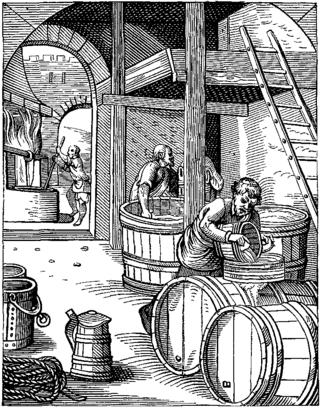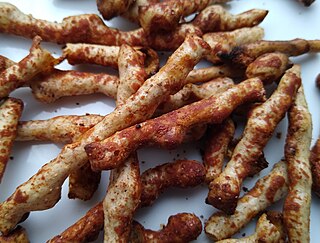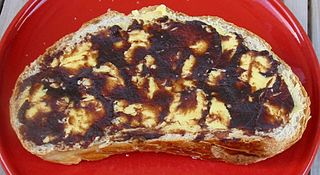| Alternative names | GYE |
|---|---|
| Type | Savoury spread |
| Place of origin | Ireland |
| Created by | Arthur Guinness Son & Co. |
| Invented | 1936 |
| Main ingredients | Yeast extract |
Guinness Yeast Extract, commonly known by its initials GYE, was an Irish savoury spread, made from yeast extract. It was a by-product of the Guinness beer brewing process and produced by Arthur Guinness Son & Co., Dublin. The product was launched in Ireland on 2 November, 1936 [1] [2] [3] and discontinued in 1968. [1] [4]
In addition to spreading on toast or bread, one or two level teaspoonfuls added to each 1 L (1 imp qt) of soup enriched the flavour while enhancing the nutritional value. It could also be used as an emergency gravy without any addition except hot water for diluting. It was used to strengthen normal gravy, and flavour stews and dishes containing minced meat. A half a teaspoonful added to a glass of hot water or hot milk produced a drink consumed at elevenses, teatime, and as a nightcap. [5]
In February 2007 Marmite produced a limited edition Guinness Marmite of 300,000 250g jars of their yeast extract with 30% Guinness yeast. [6]

Brewing is the production of beer by steeping a starch source in water and fermenting the resulting sweet liquid with yeast. It may be done in a brewery by a commercial brewer, at home by a homebrewer, or communally. Brewing has taken place since around the 6th millennium BC, and archaeological evidence suggests that emerging civilizations, including ancient Egypt, China, and Mesopotamia, brewed beer. Since the nineteenth century the brewing industry has been part of most western economies.

Bovril is the trademarked name of a thick and salty meat extract paste, similar to a yeast extract, developed in the 1870s by John Lawson Johnston. It is sold in a distinctive bulbous jar and as cubes and granules. Bovril is owned and distributed by Unilever UK. Its appearance is similar to the British Marmite and its Australian equivalent Vegemite; however, unlike these products, Bovril is not vegetarian.

Marmite ( MAR-myte) is a British savoury food spread based on yeast extract, invented by the German scientist Justus von Liebig. It is made from by-products of beer brewing (lees) and is produced by the British company Unilever. Marmite is a vegan source of B vitamins, including supplemental vitamin B12. A traditional method of use is to spread it very thinly on buttered toast.

Twiglets are a wheat-based snack marketed in the United Kingdom that have a "distinctive knobbly shape" similar to that of twigs and a speckled-brown-over-pale-colour appearance. The taste of Twiglets, which has been compared to that of Marmite, primarily derives from the yeast extract used in the coating. Twiglets are packaged in 24 g, 45 g, 105 g, 150 g bags, and in 200 g cylindrical containers.

Vegemite is a thick, dark brown Australian food spread made from leftover brewers' yeast extract with various vegetable and spice additives. It was developed by Cyril Callister in Melbourne, Victoria, in 1922, and it was first sold in stores on 25 October 1923.

Yeast extracts consist of the cell contents of yeast without the cell walls; they are used as food additives or flavorings, or as nutrients for bacterial culture media. They are often used to create savory flavors and umami taste sensations and can be found in a large variety of packaged food including frozen meals, crackers, snack foods, gravy, stock and more. They are rich in B vitamins. Yeast extracts and fermented foods contain glutamic acid, an amino acid which adds an umami flavor. Glutamic acid is found in meat, cheese, fungi and vegetables—such as broccoli and tomatoes. A number of other substances found in yeast extract provide aromas, some meat-like, when allowed to react under heat.

Cenovis is a dark brown food paste from Switzerland consisting of yeast extract, onions, carrots and spices. Sold internationally under the brand Sonaris, it is similar to English Marmite, Brazilian Cenovit, and Australian Vegemite. It is rich in vitamin B1. It is used to flavour soups, sausages, and salads. The most popular way to consume Cenovis, however, is to spread it on a slice of buttered bread, as stated on the product's packaging (it can also be blended directly into butter, and then spread on bread, or used as a filling in croissants and buns).

Gravy is a topping often made from the juices of meats that run naturally during cooking and often thickened with corn starch or other thickeners for added texture. The gravy may be further coloured and flavoured with gravy salt or gravy browning or ready-made cubes. Powders can be used as a substitute for natural meat or vegetable extracts. Canned and instant gravies are also available. Gravy is commonly served with roasts, meatloaf, rice, noodles, chips (fries), mashed potatoes, or biscuits.

Ginger ale is a carbonated soft drink flavoured with ginger. It is consumed on its own or used as a mixer, often with spirit-based drinks. There are two main types of ginger ale. The golden style is credited to the Irish doctor Thomas Joseph Cantrell. The dry style, a paler drink with a much milder ginger flavour, was created by Canadian John McLaughlin.

The Sanitarium Health and Wellbeing Company is the trading name of two sister food companies. Both are wholly owned by the Seventh-day Adventist Church.

Promite is a dark brown, salty food paste derived from yeast extract. It is primarily used as a spread on sandwiches and toast similar to Vegemite and Marmite. Promite was invented in the 1950s by Henry Lewis & Company and marketed under the Masterfoods brand. Henry Lewis & Company later became MasterFoods Australia and New Zealand, before being bought out by Mars, Incorporated, a privately owned U.S. company, in 1967. Promite has continued to be manufactured and primarily sold in Australia.

Apple butter is a highly concentrated form of apple sauce produced by long, slow cooking of apples with apple juice or water to a point where the sugar in the apples caramelizes, turning the apple butter a deep brown. The concentration of sugar gives apple butter a much longer shelf life as a preserve than apple sauce.

Nutritional yeast is a deactivated yeast, often a strain of Saccharomyces cerevisiae, that is sold commercially as a food product. It is sold in the form of yellow flakes, granules, or powder and can be found in the bulk aisle of most natural food stores. It is popular with vegans and vegetarians and may be used as an ingredient in recipes or as a condiment.
Bisto is a popular and well-known brand of gravy and other food products in the United Kingdom and Ireland, currently owned by Premier Foods.
Wort is the liquid extracted from the mashing process during the brewing of beer or whisky. Wort contains the sugars, the most important being maltose and maltotriose, that will be fermented by the brewing yeast to produce alcohol. Wort also contains crucial amino acids to provide nitrogen to the yeast as well as more complex proteins contributing to beer head retention and flavour.

A food paste is a semi-liquid colloidal suspension, emulsion, or aggregation used in food preparation or eaten directly as a spread. Pastes are often highly spicy or aromatic, are often prepared well in advance of actual usage, and are often made into a preserve for future use. Common pastes are some fruit preserves, curry pastes, and nut pastes. Purées are food pastes made from already cooked ingredients.

Marmite is a food spread produced in New Zealand by Sanitarium Health and Wellbeing Company and distributed in Australia and the Pacific. Marmite is made from yeast extract, a by-product of beer brewing. It is similar to the British Marmite, but the two products are made by different companies.